Could America split up?
On the war within the states


A free daily email with the biggest news stories of the day – and the best features from TheWeek.com
You are now subscribed
Your newsletter sign-up was successful
All week I've been haunted by a brief few seconds of video posted on Twitter late Sunday night by a student journalist in Eugene, Oregon. Two men face off at a protest — the one standing on the left is demonstrating for Black Lives Matter; the one on the right, sitting in a pickup truck, is a counter-protester. Each is pointing a handgun at the other's face at point blank range.
That's us. That's America during the long, hot summer of 2020.
I often catch myself pondering exactly what it is that keeps our country together. What do we hold in common? What do we share? The word "republic" comes from the Latin res publica — literally "public thing." What is the single "thing" that is our public, political self? What binds us? Our national motto is E pluribus unum — out of many, one. What is this "one"? Is it just the totality of the clashing, conflicted individuals and groups? Or is the collectivity something substantial in its own right that orders the parts and unites them?
The Week
Escape your echo chamber. Get the facts behind the news, plus analysis from multiple perspectives.

Sign up for The Week's Free Newsletters
From our morning news briefing to a weekly Good News Newsletter, get the best of The Week delivered directly to your inbox.
From our morning news briefing to a weekly Good News Newsletter, get the best of The Week delivered directly to your inbox.
I see so much anger around me — at the grocery store, while driving, on television, online. I feel so much of it myself: Rage that a congressman from Texas caught COVID-19 after discouraging his staff on Capitol Hill from wearing masks during the worst pandemic in a century. Rage that our reality-show-conman president would rather publicize absurd conspiracy theories, spread civic poison throughout the nation, and undermine confidence in our capacity to hold free and fair elections than fulfill the most elemental duties of his office. Rage that, although this president is down in the polls, two out of every five Americans continue to approve of how he's doing his job.
Who are these people? What do I share with them? Aristotle suggests that at its best, citizenship can be a form of friendship. But America is nowhere near its best right now. These people may be my fellow citizens, but they aren't my friends. Sometimes they feel like my enemies.
How has it come to this? The right feels like it's fighting for its very life against a left that's waging a scorched-earth campaign against it. As far as the right is concerned, progressives don't just want to win. They want to grind conservatives into the dust, humiliate them, force them to jump through public hoops, and confess their sins before the world. And the list of sins grows ever longer — on race, on religion, on sex, on gender. The goalposts always shift further. Each triumph for the left is followed by the opening of another front in a rolling cultural revolution. The right feels desperate — and understands every one of its own moves as an equal and opposite reaction to a prior offensive on the part of its political and cultural antagonists.
The left, meanwhile, views things exactly in reverse. The story of the country is one characterized by unjust domination by a narrow class of white, male, heterosexual, cisgendered oppressors, and then a slow, grinding fight toward greater liberty and equality for every identity. Yet instead of giving up its exclusive privileges and conceding the justice of continuing with progress toward ever-greater democracy, the right has mounted a counter-assault that aims to reverse the progress America has made, with the ultimate goal of propping up its remaining power and then actively narrowing the circle of citizenship in the hopes of turning back the clock to a time when white, heterosexual, cisgendered men were in charge of everything. That poses an existential threat to all that's worthwhile about the country and fully justifies uncompromising acts to thwart its realization.
A free daily email with the biggest news stories of the day – and the best features from TheWeek.com
There is more to each side of the story — with social, economic, regional, and class-based concerns intertwining with and amplifying each faction's list of grievances and providing ample material for endless rounds of self-justification and excuse-making. But the culture war is the motor driving it all, with high-octane fuel supplied by legions of cheerleading rabble-rousers and activists who enrich themselves, advance their careers, and derive spiritual satisfaction from revving up the outrage.
So what's the answer? Can a culture war be won decisively enough that the vanquished slink away, humbled and contrite in their defeat?
Or is the fight the point?
And if the fight is the point — as it increasingly seems to be — can the conflict remain contained indefinitely?
Six months ago, I was largely persuaded by Ross Douthat's argument in his recent book The Decadent Society, according to which most of the animus and rancor of our political moment is a kind of pantomime enacted virtually. On Twitter and other social media platforms, on cable news, and on talk radio, Americans do battle with one another, fighting a digital civil war, like participants in a civic shooter-game. But in the real world, nothing much happens or changes, with most people too lethargic to rouse themselves from their couches and risk picking up a weapon. Instead, they blow off steam online, with our furious battles ending up as "sound and fury signifying relatively little."
As I said, this seemed right to me last winter. But now, with a pandemic raging, the economy in freefall, schools poised to remain closed into the fall, the worlds of business and media undergoing cultural convulsions, civil unrest roiling cities suddenly wracked by spikes of violent crime, and a president lobbing rhetorical incendiary bombs onto the pile of kindling every day of the week — well, now I'm not so sure.
So how does it play out? What if the next time opposing protesters point guns at each other's faces, one of them pulls the trigger? What if militias of the right and left step into the vacuum left by police officers no longer willing to keep the peace? What if our hapless president decides to repeat his Portland provocations elsewhere, sparking much greater violence? What if the election in November ends up being close enough that Trump can raise uncertainty about the results in half a dozen states, prompting 40 percent of the country to reject any outcome other than a Republican victory?
What then? Part of me gravitates to a fantasy of divorce. Maybe both sides would be happier if we just separated and went our separate ways, like unhappy spouses who call it quits after a few too many wounding arguments and rounds of couples therapy.
But of course that's delusional. A nation isn't like a marriage — certainly not companionate marriage based on individual choice. But it's not even a more traditional arranged marriage where there is a period of youthful independence before the union is announced and formalized. Unless you're an immigrant, your country is where you find yourself at birth. It's a given — like a family in which you are born and raised before you even come to complete self-awareness. It shapes your outlook on the world in more ways than you can ever fully grasp.
Families can break up, tear themselves asunder, but it usually isn't pretty. Neither are divorces. But at least a divorce takes places within a legal and moral frame that persists outside the marriage. Certain rules abide and apply to both parties, guiding the division of marital assets and looking out for the welfare of any children, with an impartial judge overseeing and enforcing it all. There is no such external structure when an extended family breaks apart into feuding factions.
When I try to wrap my mind around what it would look like for political violence to break out and start spreading like brushfire through the country, I come up short. The historical Civil War was waged as a traditional military conflict over territory, with discrete battles, campaigns, victories, and surrenders. That's because the dispute mapped precisely onto the physical world. The North could have allowed the Confederacy to walk away, but it didn't, and so the two sides fought it out, with the South eventually losing, bringing the war to a decisive end.
But today? We talk of red states and blue states, but that's obviously simplistic. It's not even possible to speak of an archipelago of progressive coastal cities arrayed against a much less densely populated inland empire of conservatism. The fact is that even small cities in America are significantly more liberal than the small towns and countryside that surround them. I live in an inner-ring suburb of Philadelphia that is heavily Democratic, but just a few miles from my house there are neighborhoods and towns filled with loyal Republicans. We are politically intertwined. That's the way a country is supposed to be — at least when those on different sides of political disputes don't hate each other.
Do we hate each other? And if we do, what are our viable options as a polity? I don't know how to answer those questions. What I do know is that it is long past time to begin posing them.
Damon Linker is a senior correspondent at TheWeek.com. He is also a former contributing editor at The New Republic and the author of The Theocons and The Religious Test.
-
 Bad Bunny’s Super Bowl: A win for unity
Bad Bunny’s Super Bowl: A win for unityFeature The global superstar's halftime show was a celebration for everyone to enjoy
-
 Book reviews: ‘Bonfire of the Murdochs’ and ‘The Typewriter and the Guillotine’
Book reviews: ‘Bonfire of the Murdochs’ and ‘The Typewriter and the Guillotine’Feature New insights into the Murdoch family’s turmoil and a renowned journalist’s time in pre-World War II Paris
-
 Witkoff and Kushner tackle Ukraine, Iran in Geneva
Witkoff and Kushner tackle Ukraine, Iran in GenevaSpeed Read Steve Witkoff and Jared Kushner held negotiations aimed at securing a nuclear deal with Iran and an end to Russia’s war in Ukraine
-
 ‘The forces he united still shape the Democratic Party’
‘The forces he united still shape the Democratic Party’Instant Opinion Opinion, comment and editorials of the day
-
 ‘Those rights don’t exist to protect criminals’
‘Those rights don’t exist to protect criminals’Instant Opinion Opinion, comment and editorials of the day
-
 ‘The mark’s significance is psychological, if that’
‘The mark’s significance is psychological, if that’Instant Opinion Opinion, comment and editorials of the day
-
 ‘The West needs people’
‘The West needs people’Instant Opinion Opinion, comment and editorials of the day
-
 ‘The censorious effect is the same, even if deployed covertly’
‘The censorious effect is the same, even if deployed covertly’Instant Opinion Opinion, comment and editorials of the day
-
 Vietnam’s ‘balancing act’ with the US, China and Europe
Vietnam’s ‘balancing act’ with the US, China and EuropeIn the Spotlight Despite decades of ‘steadily improving relations’, Hanoi is still ‘deeply suspicious’ of the US as it tries to ‘diversify’ its options
-
 ‘The sport is still run on a shoestring’
‘The sport is still run on a shoestring’Instant Opinion Opinion, comment and editorials of the day
-
 ‘We know how to make our educational system world-class again’
‘We know how to make our educational system world-class again’Instant Opinion Opinion, comment and editorials of the day
